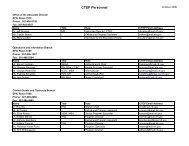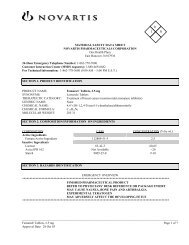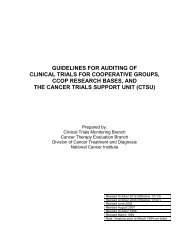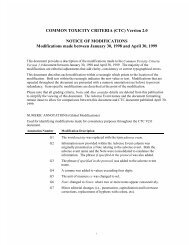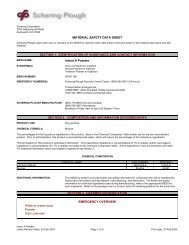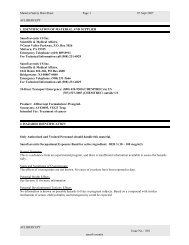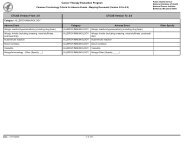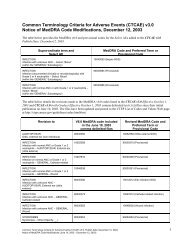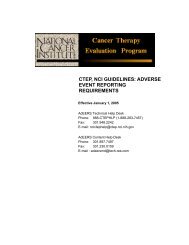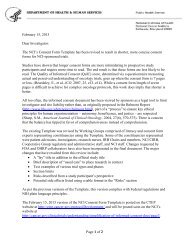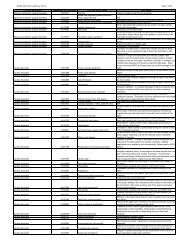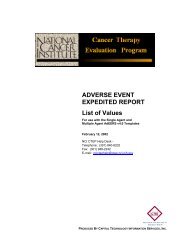NCI National Clinical Trials Network (NCTN) Program Guidelines
NCI National Clinical Trials Network (NCTN) Program Guidelines
NCI National Clinical Trials Network (NCTN) Program Guidelines
Create successful ePaper yourself
Turn your PDF publications into a flip-book with our unique Google optimized e-Paper software.
PART 1: Overview of <strong>NCTN</strong> <strong>Program</strong> Section IV – Terms/Conditions of Award – <strong>Network</strong> Group Ops Centers<br />
the organizational structure, composition, and specific responsibilities of each <strong>Network</strong> Group<br />
committee (scientific and administrative) as well as study teams and membership for<br />
institutions/sites.<br />
Scientific Research Committees: The primary responsibilities of the scientific research<br />
committees are to develop the specific trial proposals (Letters of Intent (LOI) and Concepts) for<br />
approval by the <strong>NCTN</strong> <strong>Program</strong>, oversee protocol development and trial conduct for approved<br />
studies, and to help effect the <strong>Network</strong> Group’s overall research strategy. Disease committees<br />
(e.g., breast, gastrointestinal, thoracic) are responsible for adhering to procedures for<br />
study/protocol development, including adhering to time-lines for Concept and LOI development<br />
and subsequent protocol development for approved Concepts and LOIs as set out by the<br />
<strong>Network</strong> Group Operations Center for compliance with <strong>NCI</strong>/DTCD Operational Efficiency<br />
Working Group timelines. Other committees (e.g. correlative science, experimental<br />
therapeutics, experimental imaging sciences) are responsible for providing input to or<br />
developing ancillary studies for disease committee trials that enhance the quality of the <strong>Network</strong><br />
Group’s overall research strategy.<br />
Study Monitoring by Scientific Committees & Study Teams: The primary responsibility for study<br />
monitoring resides with the Study Chair, Study Statistician and other members of the study team<br />
that helps develop and oversees conduct of a specific study. The scientific research committee<br />
(e.g., disease committee) is responsible for assuring that the study team is satisfactorily meeting<br />
its responsibilities for study monitoring.<br />
Administrative Committees: Administrative committees provide essential core service functions<br />
to support the <strong>Network</strong> Group’s research program. For example, a patient advocacy committee<br />
may provide guidance to a disease committee by obtaining appropriate review and input from<br />
patient advocates with respect to clinical trials supported by the Disease Committee.<br />
Administrative Committees should have clearly described responsibilities and mechanisms for<br />
measuring the performance of the Committees in meeting those responsibilities. Administrative<br />
Committees need not have explicit scientific research agendas, although the activities of these<br />
Committees should be important or even essential to accomplishing the <strong>Network</strong> Group’s<br />
research agenda (e.g., Audit Committee).<br />
1.1.3 Young Investigator Mentoring/Training:<br />
The <strong>Network</strong> Group Operations Center is responsible for having a mentorship program to involve<br />
young investigators in <strong>Network</strong> Group clinical trial research and to help train them eventually to<br />
take on leadership responsibilities for clinical trials and/or committees.<br />
1.1.4 Communications Support<br />
The <strong>Network</strong> Group Operations Center is responsible organizing and disseminating information<br />
about the <strong>Network</strong> Group’s scientific activities and major changes in administrative policies and<br />
procedures to its members through annual or biannual <strong>Network</strong> Group meetings that review the<br />
Group’s progress, establish priorities, and plan future activities. Additional meetings among<br />
<strong>Network</strong> Group members and meetings with <strong>NCI</strong> staff may be held as needed. Relevant<br />
<strong>Network</strong> Group Operations Center responsibilities for meetings include: (a) arranging for<br />
appropriate meeting space and accommodations for attendees; (b) developing and distributing<br />
meeting agendas; and (c) preparing summaries as appropriate after each meeting for <strong>Network</strong><br />
Group members and <strong>NCI</strong> staff.<br />
The <strong>Network</strong> Group Operations Center is responsible for establishing routine electronic<br />
communication between itself, the associated <strong>Network</strong> Group Statistics and Data Management<br />
Center, Cancer <strong>Trials</strong> Support Unit (CTSU), and member sites participating in its trials to facilitate<br />
protocol development, trial conduct, and study monitoring. Relevant communication methods<br />
include website postings, e-mail, teleconferences, and video-conferences.<br />
Page 37 of 241



